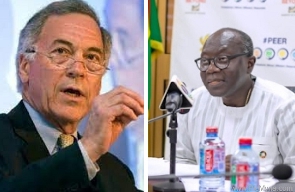 Prof Steve Hanke and Ken Ofori-Atta
Prof Steve Hanke and Ken Ofori-Atta
Professor of Applied Economics at the Johns Hopkins University, Steve Hanke, has opined that a new International Monetary Fund (IMF) deal will not solve Ghana's economic problems. In his view, the keenly awaited deal will fail like previous programmes Ghana has entered into with the Bretton Woods institution. In a Twitter post on October 12, the economist touched on Ghana’s sovereign bond, mentioning that it has lost 50% of its value this year. “While talk of a debt default swirls in Ghana, its sovereign bonds tank. They have depreciated over 50% this year. Now, Pres. Akufo-Addo passes the begging bowl to the IMF. SPOILER ALERT: like Ghana’s past 16 IMF programs, a new one will fail to fix Ghana’s problems,” Professor Hanke tweeted. Ghana has since July this year been engaging IMF hoping to secure a US$3 billion deal which will be spread across a three-year duration. Ahead of that, there are moves by the government to restructure debts of investors after the completion of a Debt Sustainability Analysis (DSA) by IMF. A debt restructuring will result in a longer yield-to-maturity for government bonds and bills, or the implementation of the "haircut" strategy. Some investors' returns on investments may be impacted by this. Meanwhile, former President John Dramani Mahama in an interview on VOA’s Straight Talk Africa has called for an end to the country’s continuous resort to the International Monetary Fund whenever it is confronted with economic headwinds. He said the “going and coming” to the IMF depleted people’s faith in the country’s democracy and it also created instability. He mentioned that the current return to the IMF to achieve debt sustainability and policy credibility should mark the start of governments prudently running the economy. “The economy is situated in an environment. It does not exist in isolation and so there are somethings that need to be done to create an environment for the economy to thrive. Some of them are governance issues, strengthening state-owned institutions, the fight against corruption and so many other things that create the environment for the economy to thrive. “I think that when we go into this programme and we bring debts back to sustainable levels and we are able to get the bridging facility in other to achieve policy credibility so that investors again feel confident that they can bring back their money into Ghana, then we must start from there and maintain that prudence. "This should be the last time we go to the IMF because going and coming, it creates a certain instability in the whole system and it also reduces the faith that people have in our democracy,” Mahama said.
Professor of Applied Economics at the Johns Hopkins University, Steve Hanke, has opined that a new International Monetary Fund (IMF) deal will not solve Ghana's economic problems. In his view, the keenly awaited deal will fail like previous programmes Ghana has entered into with the Bretton Woods institution. In a Twitter post on October 12, the economist touched on Ghana’s sovereign bond, mentioning that it has lost 50% of its value this year. “While talk of a debt default swirls in Ghana, its sovereign bonds tank. They have depreciated over 50% this year. Now, Pres. Akufo-Addo passes the begging bowl to the IMF. SPOILER ALERT: like Ghana’s past 16 IMF programs, a new one will fail to fix Ghana’s problems,” Professor Hanke tweeted. Ghana has since July this year been engaging IMF hoping to secure a US$3 billion deal which will be spread across a three-year duration. Ahead of that, there are moves by the government to restructure debts of investors after the completion of a Debt Sustainability Analysis (DSA) by IMF. A debt restructuring will result in a longer yield-to-maturity for government bonds and bills, or the implementation of the "haircut" strategy. Some investors' returns on investments may be impacted by this. Meanwhile, former President John Dramani Mahama in an interview on VOA’s Straight Talk Africa has called for an end to the country’s continuous resort to the International Monetary Fund whenever it is confronted with economic headwinds. He said the “going and coming” to the IMF depleted people’s faith in the country’s democracy and it also created instability. He mentioned that the current return to the IMF to achieve debt sustainability and policy credibility should mark the start of governments prudently running the economy. “The economy is situated in an environment. It does not exist in isolation and so there are somethings that need to be done to create an environment for the economy to thrive. Some of them are governance issues, strengthening state-owned institutions, the fight against corruption and so many other things that create the environment for the economy to thrive. “I think that when we go into this programme and we bring debts back to sustainable levels and we are able to get the bridging facility in other to achieve policy credibility so that investors again feel confident that they can bring back their money into Ghana, then we must start from there and maintain that prudence. "This should be the last time we go to the IMF because going and coming, it creates a certain instability in the whole system and it also reduces the faith that people have in our democracy,” Mahama said.
#EconWatch: While talk of a debt default swirls in Ghana, its sovereign bonds tank. They have depreciated over 50% this year. Now, Pres. Akufo-Addo passes the begging bowl to the IMF. SPOILER ALERT: like Ghana’s past 16 IMF programs, a new one will fail to fix Ghana’s problems. pic.twitter.com/FDNGJEArRs— Steve Hanke (@steve_hanke) October 12, 2022 Watch the latest episode of BizTech below: